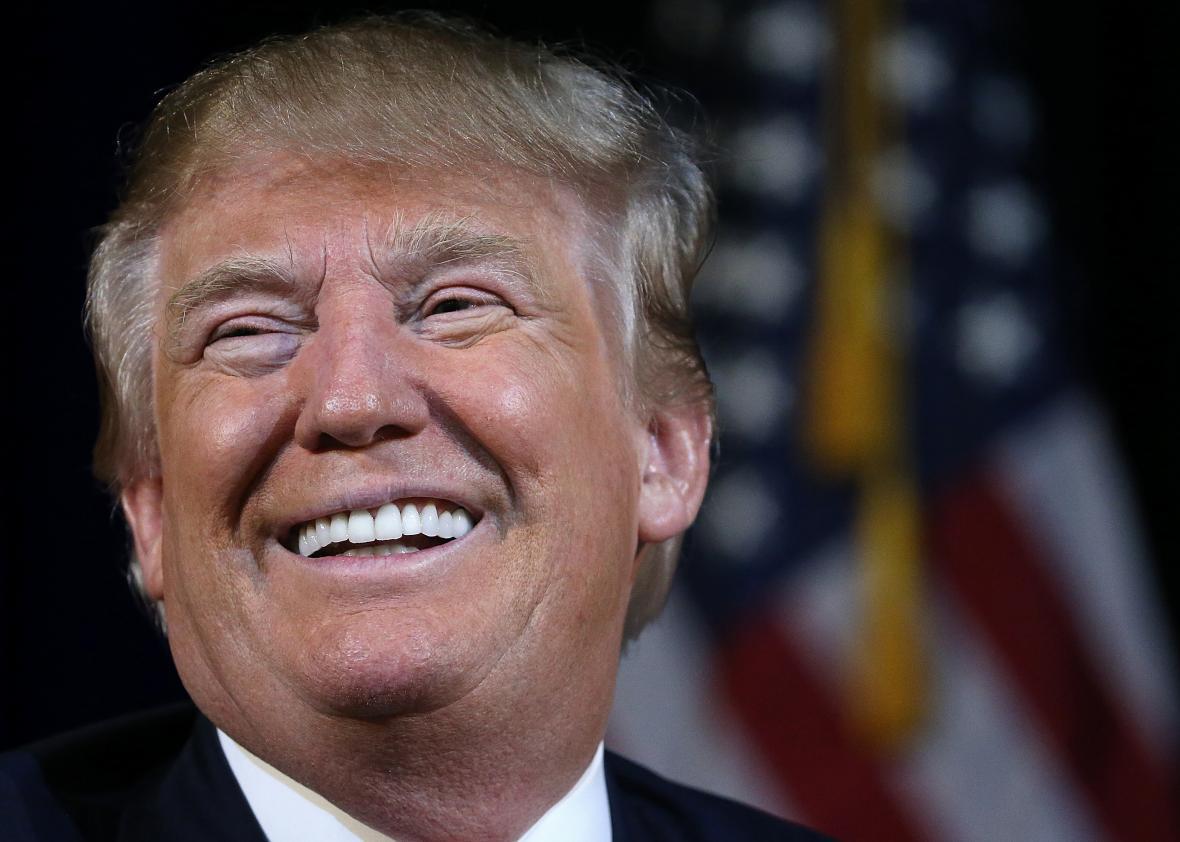Donald Trump spent much of the 2000s trend-hopping between hot industries that ranged from tacky to fraudulent, trying his hand at everything from overpriced vodka (unsuccessful) to reality TV (very successful) to for-profit education (reprehensible). So it’s not very surprising that the Republican presidential front-runner also attempted to get in on the housing bubble just as it began to burst.
Slightly more surprising: The ill-fated foray might actually tell us something about Trump’s true strengths as a businessman.
As the Washington Post recounts, Trump Mortgage officially launched in the spring of 2006. The timing could not have been worse. Mortgage mania was coming to its disastrous end. Home prices were cresting and new sales were already falling, which reporters dutifully pointed out in interviews with the mogul. “I think it’s a great time to start a mortgage company,” Trump boasted nonetheless. “The real estate market is going to be very strong for a long time to come.”
It was not, of course, and Trump Mortgage closed in 2007. Worse, bad timing wasn’t even the extent of the outfit’s problems. For instance, the CEO apparently exaggerated his résumé in his online bio, which might lead some to wonder how the Donald might fare at vetting Cabinet secretaries. (But I digress!)
So how could any of this possibly reflect well on Trump? In a weird way, Trump Mortgage provides a good example of his present-day talent for making money (or at least attempting to) while minimizing risk. Trump may be a bombastic creature, but the secret to his more recent successes has actually been caution.
Some background: Early on in his career, Trump truly was the larger-than-life New York developer he now mostly just plays on TV. He built buildings. He opened casinos. And to do so, he borrowed extravagantly, personally guaranteeing much of the debt (which was not, by the way, totally abnormal in that era). When the real estate market finally went bust during the early 1990s, some of his marquee properties sank into bankruptcy while he barely escaped personal ruin.
As Trump mounted his comeback in later years, he took a very different approach. Instead of erecting and buying real estate himself, he began licensing his name to other developers while striking management deals to run the buildings. Over time, this exercise in brand extension would grow to include power ties at Macy’s, bottled water, steaks, and all sorts of hilariously ill-conceived corporate ephemera. That business model is easily mocked, but it’s also been reliably profitable. As Max Abelson at Bloomberg Businessweek writes, Trump runs absurd profit margins because his main endeavor—renting out the Trump logo—doesn’t require a lot of overhead, unlike, say, building a hotel or casino from scratch. His biggest business troubles of recent years have sprung from his attempts to once again build stuff, like the Trump Hotel Las Vegas and the Trump International Hotel and Tower in Chicago, both of which opened midrecession.
Which brings us back to Trump Mortgage. Yes, it was badly timed. But it also wasn’t much of a gamble. First, Trump told Crain’s New York that the business was merely another licensing arrangement in which he had no ownership stake. “The mortgage business is not a business I particularly liked or wanted to be part of in a very big way,” he offered by way of less-than-convincing explanation. Even if Trump did have some equity interest in the operation—the company had office space at Trump’s headquarters, which suggests a slightly closer relationship than your average licensing arrangement, and the Post says he “hired” the management—Trump Mortgage was likely a fairly lean operation. After all, it wasn’t actually a mortgage lender, making loans to customers. Instead, it was a mortgage broker, acting as a middle-man between home buyers and banks and collecting a fee. Brokers were a massive, often quite corrupt, piece of the economic doomsday machine otherwise known as the mortgage market, but they didn’t necessarily have much of their own capital at stake since, again, they weren’t actually doing any lending.
In short, Trump Mortgage was almost the ideal Donald Trump business. Sketchy. Real estate–related. Low-risk. And, if the timing hadn’t been absolutely awful, maybe, possibly lucrative. The man might not be a business visionary, but his brief, abortive mortgage adventure is an example of how he’s learned how to protect his downside. If he has any virtues as a potential chief executive, that may be it.
